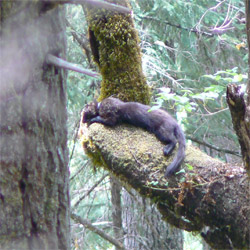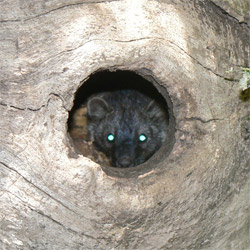An illegal pesticide used by marijuana growers to kill rodents is poisoning weasel-like fishers in California, reports a new study published in the journal PLoS ONE.
Researchers with the Wildlife Conservation Society (WCS), the Integral Ecology Research Center, the University of California Davis, and other institutions conducted necropsies on 58 fishers in northwestern California and Central California. They found that 46 of the animals were exposed to one or more anticoagulant rodenticides which are used to attract and kill rodents. At least four of the fishers died directly from ingesting anticoagulant rodenticides, according to the study.
“Fishers are likely exposed to anticoagulant rodenticides when eating animals that have already ingested the rodentcide,” stated a press release from WCS. “They may also be drawn to the poison directly by bacon, cheese and peanut butter “flavorizers” that manufacturers add to attract rodents.”
 Fisher. Photo by Rebecca Greene of Hoopa Tribal Forestry.  Fisher in a log. Photo by Kerry Rennie of Hoopa Tribal Forestry. |
“Anticoagulant rodenticides may also harm fishers by compromising the animal’s blood clotting and recovery abilities, decreasing its resilience to environmental stressors, and abandonment of dependent young due to direct mortality of adults killed by anticoagulant rodenticides.”
The study’s authors say it is unlikely the fishers were exposed to the pesticides used legally because these areas are no suitable habitat for the animals.
“Instead, the exposure points were likely encountered where AR is used illicitly as part of illegal marijuana cultivation in remote areas that overlap with fisher habitat,” according to the WCS statement. “The study cites multiple examples of confiscation of marijuana plants and discovery of associated anticoagulant rodenticides use in the region.”
Study co-author Sean Matthews of WCS explained that shrinking habitat has pushed fishers into forest areas in California’s Sierras and coastal mountains, where illegal marijuana cultivation has been expanding. The result is fishers are increasingly exposed to chemicals used by marijuana growers.
“Fishers play a vital role in the forests of the Sierra Nevada Mountains and the Pacific Northwest,” he said. “With a body the size of a house cat and the disposition of their larger cousin, the wolverine, fishers keep forest rodent populations in check and are one of the only predators with the tenacity to regularly prey on porcupines.”
“The findings in this paper could signal a looming conservation threat for other species as well as fishers,” he continued. “As we discuss in the study, depletion of rodent prey populations upon which fishers and other animals feed, along with the anticoagulant poisoning threat might affect the Sierra Nevada red fox, wolverine, California spotted owls and other rare carnivores that inhabit the region.”
CITATION: Gabriel MW, Woods LW, Poppenga R, Sweitzer RA, Thompson C, et al. (2012) Anticoagulant Rodenticides on our Public and Community Lands: Spatial Distribution of Exposure and Poisoning of a Rare Forest Carnivore. PLoS ONE 7(7): e40163. doi:10.1371/journal.pone.0040163
Related articles